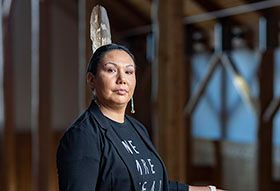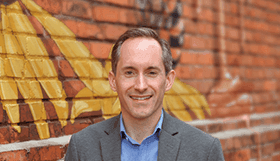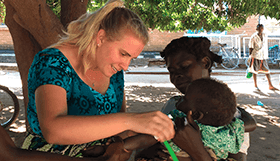UW Major: Social Change, Youth Culture, And The Arts
Age: 39 | Chicago
Chief Empowerment Officer, 7 Mindsets
Roberto Rivera has helped troubled youth to realize in as little as 10 weeks what it took him years to understand for himself.
“I have purpose; I have people; I have passion and yes, I even have pain,” he’s said. “And that pain can become propane for me to transform my life and to transform this world.”
As the former president of The Good Life Organization, Rivera championed education and engagement for youth aged eight to 18. The nonprofit’s programs challenged negative messages and sought to reduce rates of school dropouts, violence, and incarceration.
Through frequent speeches, hip-hop–influenced outreach, and his own spoken-word artistry, Rivera says he delivered a message of “hip-hope,” seeking to inspire young adults who struggle with school and life challenges, just as he once did.
“There was no model for what I am doing today 10 years ago.”
He created the organization’s signature program, Fulfill the Dream, a series of resources and workshops that help young adults to build life skills, identify personal strengths, and creatively solve problems in their communities.
In 2017, Rivera sold The Good Life Organization to 7 Mindsets, a digital education company that engages youth and motivates them to become change agents in their local communities. Rivera — who is also now a PhD student at the University of Illinois–Chicago studying social-emotional learning — is in charge of all of the work that 7 Mindsets does to reach underserved youth. He also oversees research initiatives and the group’s international youth-voice board.
Rivera’s life’s work grew out of his time at UW–Madison, where he created his own major within the College of Letters and Science — Social Change, Youth Culture, and the Arts — and influenced the creation of the UW’s First Wave, the nation’s first university program for urban arts, spoken word, and hip-hop culture.
“This degree gave me the interdisciplinary foundation, confidence, and vision to eventually start my own social enterprise and start working with educators and youth globally,” he says.
Rivera says that 7 Mindsets, which has a goal of reaching two million youth in the next five years, has launched a series of workshops that train educators to engage young people using holistic and culturally relevant methods. This approach activates social and emotional learning with messages of empowerment and social justice using hip-hop culture.
“There was no model for what I am doing today 10 years ago,” Rivera says. “UW–Madison was like a greenhouse for me to be able to dream, and when the time was right, I was able to take these dreams and live them out in the world.”
Essay by Roberto
UW–Madison gave me a place to incubate my dreams. Some dreams aren’t quite ready to be taken into the wide world and take root; they need to be carefully tended, watered, and nurtured. UW–Madison was like a greenhouse for me to be able to dream, and when the time was right, I was able to take these dreams and live them out the in the world.
Although it was initially met with some resistance (like a seed pushing past the dirt), I was eventually able to create my own major at UW–Madison entitled: Social Change, Youth Culture and the Arts. This degree gave me the interdisciplinary foundation, confidence, and vision to eventually start my own social enterprise and start working with educators and youth globally. This major was also a seed that would later become what is now known as First Wave. I remember when Willie Ney hired me to consult with him and Josh Healey on starting this movement. It was truly a dream come true to see other students with a love for hiphop and a passion for service come together. I was also asked to teach the first hiphop and spoken world class on campus to educators (what is now known as Hiphop in the Heartland), and after we won a national award for innovation, that gave me the confidence that I could train educators.
There was no model for what I am doing today ten years ago, and there is no way I would be doing what I am doing today without support from key people on campus, such as Craig Werner. Craig pushed me to grow intellectually and challenged me to fully activate my own story. He is the one who helped me understand the jazz, blues, and gospel impulses and history of hiphop, and it was in regaining my history that I started to reclaim my ability to make history, and started helping youth to do the same.
Of course, I also grew tremendously when the love of my life at UW–Madison, Jennifer Leavitt-Moy, became my partner in crime there. She graduated in 2003, and we got married shortly afterwards. UW–Madison allowed us to nurture our relationship, and she also became a founder of the Good Life organization when we started it in Chicago in 2007.
UW–Madison gave me the resistance, support, and space to grow so I could do the transformative work that I am doing today. For that, I will always be grateful!





